10 Toys that Elevate Speech and Language Skills
Need to spice up playtime at your house? Need toy options that are not only fun for your child but also help stimulate your child’s speech and language skills? Well we have just the list of toys for you! We have created a list of our favorite toys as well as suggestions on how to engage your child in play that encourages development of language! We hope you learn something and find a couple options that will help elevate your child’s speech and language skills and enhance playtime!
1) Bubbles

We have never met a child that doesn’t love bubbles. Our favorite bubbles are called “Fubbles”, as they are somewhat spill-proof (just don’t shake them around too much) and the child is able to hold the container without spilling it. Children are able to practice basic oral-motor skills such as blowing and fine-motor skills such as holding the wand and popping the bubbles.
Children find the task of blowing bubbles to be difficult and will often need to request help either using a sign or word/phrase. They are very motivated so you can often get many repetitions from this one activity. I also enjoy having the child practice producing environmental sounds such as “pop” or “oh no” when the bubbles pop. Bubbles also provide an opportunity to practice labeling body parts, as I will often blow bubbles and pop them with my nose, eyes, hands or toes while labeling the body parts as they pop.
2) Farm Set
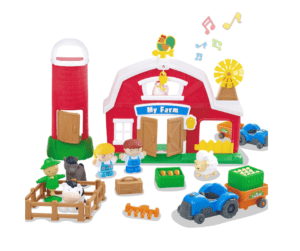
Making animal sounds is linked to both early speech and language development AND early literacy! Farm sets also allow children the opportunity to act out familiar scenarios such as making the animals eat, sleep, give hugs or kisses. Children can work on basic concepts/adjectives such as “big”, “little”, “soft”, and prepositions such as “in”, “out”, “beside”. Children can also be given basic directions to follow such as “put your sheep on the roof” which helps them learn listening skills.
3) Blocks

Blocks are a fantastic activity for building language skills. Building with blocks encourages turn taking skills as children need to wait for their turn to put a block on the tower. Basic concepts (tall/short, big/small, more/less) can be addressed through building as well. Also, short phrases can be practiced when building up a tower and knocking it down (“1,2,3 go!”, “oh no!”, “uh-oh”, “knock it down”). Magna-tiles or Picasso Tiles are some of my favorites, as they are magnetic and can be made into ramps, towers, castles, or anything your imagination can think of!
4) Dolls & Actions Figures

Playing with dolls or Action Figures allows for an abundance of opportunities for children to practice their language skills. Children can replicate many meaningful real-life experiences such as feeding, dressing and bathing the doll while practicing action words, emotion words and short phrases (e.g., The doll is sleeping). Basic inferencing can be introduced by having the adult ask a question such as “What should she do if she is hungry?” If the child has difficulty answering the question, the adult can model the answer for them. With repetition they will learn to answer the question independently!
5) Doll House

Similar to a farm set, a doll house allows for a number of opportunities for language. Children can practice basic concepts, following basic directions and adjectives. The dolls can complete actions such as jumping, sleeping, eating, etc.
6) Pretend Kitchen/Play-Food
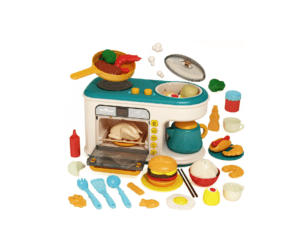
Cooking provides plenty of opportunities to introduce descriptive vocabulary as the parent talks about all the ingredients (colors, size, shape, taste). Children get the chance to use action words such as stir, mix, cut, and roll. Cooking is a great way to work on sequencing and storytelling as the adult and child can discuss and recall the steps in a recipe. If more than one child is involved it is a great time to practice social language (e.g., “Can I have a turn please?”).
7) Play-Doh
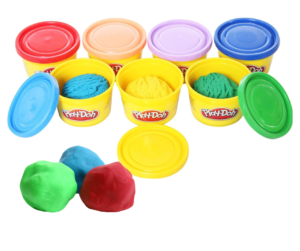
Playing with play-dough provides opportunities for practice with verbs (mix, throw, roll, cut) and following directions (e.g., “make a ball”, “cut the pizza”). It also provides opportunities for the child to make requests (help me, cut please, throw ball). Parents can model basic sentences and have the child imitate them in order to increase comprehension of grammatical rules (e.g. I am cutting. I cut the play-dough. I threw the ball).
8) Mr. & Mrs. Potato Head
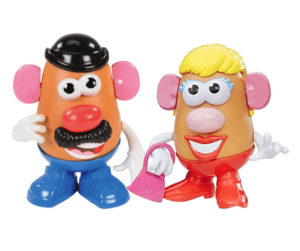
As far as therapy toys go, this was one of the first ones we ever had here at the clinic. Children are enthralled with these silly spuds for some reason! There are tons of language opportunities with this toy. Body parts, emotions, clothing, size comparisons, prepositions, etc., And even more important, tons of social interaction and pretend play.
9) Popper Toys
These are some of OUR FAVORITE toys. We have this guy (Hog Wild Pig Popper Toy):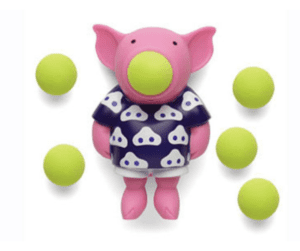
and everyone LOVES him!
They make these pop toys in all different animals. Not only do they encourage the use of sound play (zoom, pop, wow) but they are often hard for the child to pop alone which encourages a great deal of requesting. They also address fine-motor skills as the child tries to push on the pigs belly to make the ball pop.
10) Reusable Stickers and Play Scenes
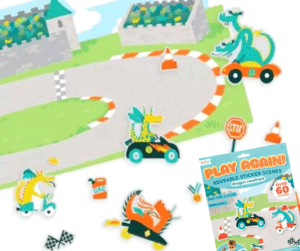
We always have stickers and play scenes in the clinic, as children have a great time making up scenarios using the stickers. We favor Melissa and Doug’s Sticker Pad, but there a ton of options out there. Children can practice everyday scenarios (e.g., the boys and girls go to school, the animals play on the farm, etc.), pronouns, action words and more!
More Ideas or More Help?
This list is just a starting point. We hope it provides you with some ideas so that playtime can be even more fun and you and your child can continue working to elevate their speech and language skills. If you feel that you and your child need help navigating and elevating their Speech and Language skills, please call today to chat with our speech-language pathologists. We can work together to get an assessment for your child from our pediatric professionals. We can be reached at 773-687-9241 to help with all speech and language needs!


